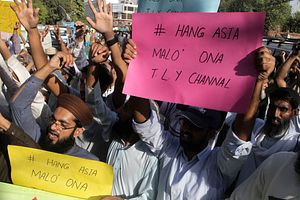Pakistan’s top court’s decision to free Aasia Bibi, a Christian women accused of committing blasphemy, has led to violent protests across Pakistan. The situation continues to grow worse as protesters have blocked major highways across the country and main urban centers in Pakistan remain under lockdown.
Pakistan appears to be in deep trouble. The worsening law and order problem seems to be pointing toward a security challenge that the country may have never faced previously. There are a number of explanations for why the ongoing madness poses an existential threat to Pakistan’s security and stability in the long run.
There have been arguments regarding how the country’s military has been able to deal with a radical group in the form of the Tehreek-e Taliban Pakistan (TTP). Therefore, dealing with any other extremist should not be considered a challenge. However, what remains unexplored is this: while the TTP was a group that killed thousands of people in Pakistan and deserved its widespread infamy, Tehreek Labaik Ya Rasool Allah (TLY) and its like-minded groups have “everyday extremists” at their disposal. They are based in Pakistan itself and believe in religious narratives that are intolerant and disallow space for ideas that go against their religious ideas.
People protesting in the streets across the country now don’t simply disagree with the decision of a state institution, but are entirely unwilling to even look at the evidence, which proves that Aasia didn’t commit blasphemy. One of the main religious groups leading protests against the Supreme Court’s decision has openly called for the death of the judges who decided the case. Moreover, the TLY has not only openly called for the murder of Aasia, but has also issued decrees to kill anyone that may have been part of the case.
Pakistani Prime Minister Imran Khan a day ago delivered a strong warning to religious hardliners, warning them of action if they didn’t stop inciting violence against the state. However, the realization among ruling circles has been that the challenge of clearing roads, streets, highways, and cities from protesters is not a one-dimensional security challenge where just one group is threatening the state’s security. The state with its decades-old policy of appeasing radical in Pakistan has apparently radicalized millions of minds. In the minds of these extremist protesters, they are doing the right thing, as something unjust and un-Islamic has happened — regardless of what the evidence says. This shows the level to which radicalism has penetrated Pakistani society.
It’s expected now that the state is going to capitulate in front of the protesting religious right. This may bring back traffic on roads and create a situation of normalcy in the country. Where this all leads is clear: the inaction on the part of the state is only going to strengthen the narrative of hardliners such as the TLY and other religious groups. The decision of the Supreme Court to free Aasia is a decision on behalf of the state and with the latter unwilling to implement the former’s decision in its essence Pakistan has entered a phase where the religious right has become more powerful than any institution in Pakistan.
The government is not willing to target protesting individuals, let alone target the narrative of religious intolerance that has brought out thousands of people in streets. As expected, it’s the state that is again backing down: according to some reports, the government is considering placing Aasia’s name on the Exit Control List (ECL), barring her from leaving the country. Moreover, a review petition is likely to be filed against the Supreme Court’s verdict. It’s unfortunate that even after threats to the heads of various state institutions, there appears to be no plan to deal with extremist forces and the expected course of action concerning appeasing radicals is taking shape.
Moreover, what is more worrying is this: the ongoing crisis situation is not something that can be overturned with just a military operation. As long as the narrative and mindset of religious intolerance and bigotry are not confronted, the current crisis may be overpowered but religious prejudice will further grow stronger. Thousands of protesters across the country are defiantly asking the state to take back its decision or face consequences. This should be enough to wake up the country’s ruling elite before it’s too late for Pakistan.
































